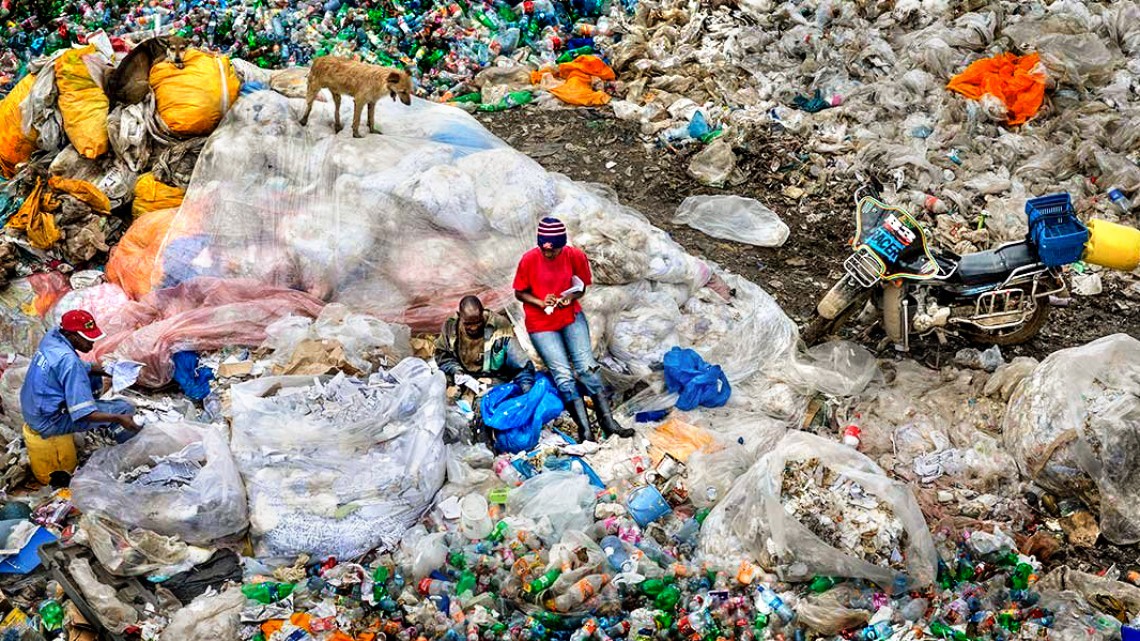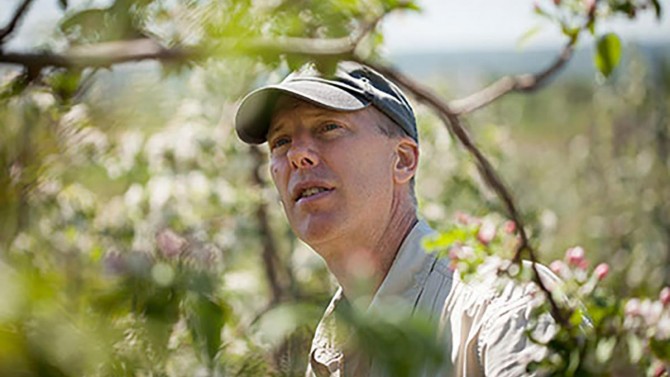
“Anthropocene: The Human Epoch” screens Sept. 25 at Cornell Cinema, a cinematic meditation on how humanity has reshaped the planet.
Things to Do, Sept. 20-27, 2019
By Daniel Aloi
Climate Strike events
Local events for the international Climate Strike day of action on Sept. 20 will include a rally on Ho Plaza at 11 a.m. by Cornell students, who will march to the Ithaca Commons for the Ithaca Global Climate Strike beginning at noon, joined by students marching from the Ithaca College campus.
The Paleontological Research Institution hosts the Ithaca Climate Action Rally, 3-5 p.m. at Stewart Park’s small pavilion, with organizations sharing information on their work combating climate change. Speakers will include Louis Derry, professor of earth and atmospheric sciences; state Assemblywoman Barbara Lifton, D-125th; Tracy Mitrano, J.D. ’95, 2020 Democratic candidate for the 23rd Congressional District; and Lehman Alternative Community School students Maya Soto and Clara Swartwout.
Following the rally, a Discover Cayuga Lake sunset cruise, 6-8 p.m., will feature a talk on climate change and local watersheds by Chuck Greene, professor of oceanography in the Department of Earth and Atmospheric Sciences. Sign up online for free student tickets and discounts.
Korean Language Program celebrates
The rich cultural history of Korea will be featured at the Korean Language Program’s 30th anniversary celebration, Sept. 20 at 6:30 p.m. in Rhodes-Rawlings Auditorium, Klarman Hall. The event is free and all are welcome.
The reception will include Korean food, music and dance, with performances by Shimtah (percussion), E.Motion (K-pop), LOKO (contemporary dance) and HanChum (traditional dance); and a short documentary on the program’s founding, its growth over the years and the people and student organizations that have supported it.
The program was started by John Whitman, now professor and chair of linguistics, with Heyrin Diffloth Cheong, the first Korean Language Program (KLP) lecturer. Enrollment has reached a record high, with more than 100 students this year.
“I believe that language can be a driving force connecting different people and understanding different cultures to make the world a better place,” said KLP lecturer Meejeong Song, senior lecturer in the Department of Asian Studies. The program provides student-centered, project-based instruction, and fun extracurricular activities fostering “student motivation and engagement in learning the language and culture with enthusiasm,” she said.
Feminist theory book club
The Feminist, Gender and Sexuality Studies Program at Cornell hosts a monthly feminist theory book club this fall at Buffalo Street Books, Ithaca, starting Sunday, Sept. 22.
The titles to be discussed and meeting dates for The Future is Feminist Book Club are: “Lose Your Mother: A Journey Across the Atlantic Slave Route” by Saidiya Hartman, Sunday, Sept. 22; “Normal Life: Administrative Violence, Critical Trans Politics, and the Limits of Law” by Dean Spade, Oct. 20; “Why Women Have Better Sex Under Socialism” by Kristen Ghodsee, Nov. 17; and “Black Feminism Reimagined: After Intersectionality” by Jennifer C. Nash, Dec. 8.
The book club is open to all. The first 25 people to sign up receive a free copy of each book.
Human impact
Cornell Cinema joins theaters nationwide Sept. 25 in a special one-night screening of “Anthropocene: The Human Epoch,” timed to coincide with the United Nations Climate Summit in New York City.
Showing at 7 p.m. in Willard Straight Theatre, the 2019 documentary feature is both a sensory experience and a cinematic meditation on humanity’s re-engineering of the planet on a massive scale.
Facilitating an informal post-screening discussion will be Jenny Goldstein, professor of development sociology, who this semester is teaching Climate Change and Global Development: Living in the Anthropocene; and Andrew Moisey, professor of the history of art and visual studies, who is teaching Documentary Art. The screening is part of Cornell Cinema’s Energy: Quest & Consequence and Art and Architecture Docs film series.
Also showing: Danny Boyle’s what-if Beatles fantasy “Yesterday,” Sept. 20-21; “Touki Bouki” (1973), a French New Wave-styled film from Senegal, Sept. 24 at 7 p.m.; and “The Third Wife,” an award-winning drama set in Vietnam, Sept. 27 and 29.
Removing CO2
Phillip Milner, professor of chemistry and chemical biology, discusses the challenges in mitigating carbon dioxide emissions at the next Science on Tap, Sept. 25 at 7 p.m. at Casita del Polaris at Northstar House, 1201 N. Tioga St., Ithaca. Presented by Graduate Women in Science, the series is free and open to the public.
Milner’s topic is “Global climate change and the need for carbon dioxide removal: What can we do?” As rising atmospheric levels of carbon dioxide from the combustion of fossil fuels threaten the global climate, Milner will share some current strategies for power plants to achieve carbon dioxide sequestration and utilization.
To bee alone
Not all bees live in hives. The vast majority – more than 90 percent – of all bee species actually live solitary lives.
Bryan Danforth, professor and chair of the Department of Entomology, will discuss the diversity of these solitary species, their behaviors and the environmental threats they face, in a Chats in the Stacks book talk, Sept. 26 at 4 p.m. in 160 Mann Library. The event is free and open to the public, with refreshments provided.
Danforth’s new book is “The Solitary Bees: Biology, Evolution, Conservation” (2019), with co-authors Robert L. Minckley, biologist at the University of Rochester, andJohn L. Neff, director of the Central Texas Melittological Institute.
The book provides an overview of solitary bee species, along with scientific discoveries about these crop pollinators and descriptions of complex and fascinating bee behaviors. The authors also highlight the plight of solitary bees, currently threatened by habitat loss, pesticides, pathogens, parasites, invasive species and climate change.
Bonding on the field
The Department of Performing and Media Arts (PMA) presents “The Wolves,” a high-energy, high-impact play about young women athletes coming of age in contemporary American society, Sept. 26-28 in the Schwartz Center for the Performing Arts’ Flex Theatre.
“The Wolves” features nine undergraduate actors as members of a girls’ high school soccer team. Written by Sarah DeLappe and directed by PMA associate professor Beth F. Milles ’88, the play examines issues of inclusion and exclusion, teamwork and acceptance. With the toughness of its characters, it also engages and upends preconceived notions about girlhood and femininity.
Cornell women’s soccer coaches and players led practices, drills and games to help the actors train for their physically demanding roles. The cast also includes Adara Alston ’99 as Soccer Mom.
Performances are Sept. 26, 27 and 28 at 7:30 p.m., with a matinee Sept. 28 at 2 p.m., followed by a Q&A with the cast and a raffle for prizes from PMA and Cornell Athletics. Tickets are $18 general, $12 for students, senior citizens and the Cornell community, at schwartztickets.com or the Schwartz Center box office, open Monday through Saturday, 1-8 p.m.
Parkland activists to speak
The Cornell Public Service Center presents a talk by student activists Samantha Fuentes and David Hogg, Sept. 28 at 2 p.m. in Call Auditorium, Kennedy Hall. Free tickets are available at cornelltickets.com.
Hogg and Fuentes were among the survivors of the mass shooting at Marjory Stoneman Douglas High School in Parkland, Florida, that claimed the lives of 17 students and staff on Feb. 14, 2018. With other Parkland survivors, they co-founded the March for Our Lives youth movement to prevent gun violence.
Their talk, “Engage in Change,” will focus on the community impact of engaged and empowered youth. A moderated Q&A will follow; submit questions in advance. Sign language interpretation will be provided and the event will be livestreamed.
Media Contact
Get Cornell news delivered right to your inbox.
Subscribe

